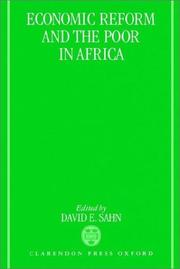| Listing 1 - 3 of 3 |
Sort by
|
Book
ISBN: 1475551975 1484365054 Year: 2015 Publisher: Washington, D.C. : International Monetary Fund,
Abstract | Keywords | Export | Availability | Bookmark
 Loading...
Loading...Choose an application
- Reference Manager
- EndNote
- RefWorks (Direct export to RefWorks)
This paper reviews trends in taxation and revenue in MENA countries over 1990-2012, with a focus on non-resource taxes. On average, non-resource revenues declined slightly, while resource revenues soared. Country experiences vary: rates of main taxes and their revenues tend to be higher in the Magreb than in the Mashreq, except for the value-added tax, where lower rates are associated with equal or higher revenue; most oil producers raise little tax revenues—generally less than 5 percent of GDP—and most have reduced them since the late 1990s. But there are similarities: unlike common experience around the world, income taxes (not indirect taxes) have partially compensated for lost revenue from trade liberalization; revenues from indirect taxes have remained stable; personal income taxes have played an unimportant role as a revenue tool; and fees and stamp duties are significant revenue sources. Looking forward, tax reform challenges will also vary across countries: the Maghreb needs to focus on efficiency-enhancing reforms, especially in capital income and consumption taxes; the Mashreq have some room to increase revenue; and, there are ample opportunities to improve equity and reduce complexity of tax systems in all countries. Finally, the recent decline in oil prices and revenues is a reminder that even resource-rich GCC countries need to lay the basis of a tax system for the future.
Fiscal policy -- Africa, North. --- Fiscal policy -- Middle East. --- Revenue -- Africa, North. --- Revenue -- Middle East. --- Taxation -- Africa, North. --- Taxation -- Middle East. --- Political Science --- Law, Politics & Government --- Public Finance --- Taxation --- Corporate Taxation --- Taxation, Subsidies, and Revenue: General --- Personal Income and Other Nonbusiness Taxes and Subsidies --- Business Taxes and Subsidies --- Taxation, Subsidies, and Revenues: Other Sources of Revenue --- Taxation and Subsidies: Other --- Trade Policy --- International Trade Organizations --- Public finance & taxation --- Corporate & business tax --- Revenue administration --- Tax incentives --- Corporate income tax --- Value-added tax --- Taxes on trade --- Taxes --- Revenue --- Corporations --- Spendings tax --- Tunisia

ISBN: 0198290357 9780198290353 Year: 1996 Publisher: Oxford Clarendon
Abstract | Keywords | Export | Availability | Bookmark
 Loading...
Loading...Choose an application
- Reference Manager
- EndNote
- RefWorks (Direct export to RefWorks)
Third World: economic development problems --- Africa --- Foreign exchange administration --- Poor --- Agriculture and state --- Income --- Fiscal policy --- Economic policy --- -330.362 --- P6 --- -Income --- -Poor --- -Foreign exchange administration --- -Foreign exchange --- Disadvantaged, Economically --- Economically disadvantaged --- Impoverished people --- Low-income people --- Pauperism --- Poor, The --- Poor people --- Persons --- Social classes --- Poverty --- Family income --- Fortunes --- Household income --- Personal income --- Economics --- Finance --- Property --- Wealth --- Gross national product --- Profit --- Purchasing power --- Tax policy --- Taxation --- Finance, Public --- Agrarian question --- Agricultural policy --- Agriculture --- State and agriculture --- Land reform --- macro economie - macro economisch evenwicht --- Afrika --- Economic conditions --- Government policy --- Economic policy. --- -macro economie - macro economisch evenwicht --- 330.362 --- Foreign exchange --- Developing countries: economic development problems --- Foreign exchange administration - Africa --- Poor - Africa --- Agriculture and state - Africa --- Income - Africa --- Fiscal policy - Africa --- Africa - Economic policy
Book
ISBN: 1451864760 1462304397 1451909292 9786613828859 1452775362 1283516403 Year: 2006 Publisher: [Washington, D.C.] : International Monetary Fund, Middle East and Central Asia Dept.,
Abstract | Keywords | Export | Availability | Bookmark
 Loading...
Loading...Choose an application
- Reference Manager
- EndNote
- RefWorks (Direct export to RefWorks)
Many countries in the Middle East and North Africa (MENA) region have recently experienced surges in money growth that apparently have not generated significant inflationary pressures. Moreover, several MENA countries have followed monetary policy rules that according to standard monetary theory should have produced macroeconomic instability and possibly hyperinflation. We argue that the Fiscal Theory of the Price Level could usefully provide insights on these developments. Our main conclusion is that a sound fiscal position constitutes a necessary condition for macroeconomic stability whereas "sound" monetary policy is neither sufficient nor necessary. Hence, fiscal policy and public debt deserve particular attention for maintaining macroeconomic stability, by and large consistent with Fund policy advice to MENA countries.
Debts, Public -- Africa, North. --- Debts, Public -- Middle East. --- Electronic books. -- local. --- Fiscal policy -- Africa, North. --- Fiscal policy -- Middle East. --- Inflation (Finance) -- Africa, North. --- Inflation (Finance) -- Middle East. --- Political Science --- Law, Politics & Government --- Public Finance --- Debts, Public --- Fiscal policy --- Inflation (Finance) --- Tax policy --- Taxation --- Debts, Government --- Government debts --- National debts --- Public debt --- Public debts --- Sovereign debt --- Government policy --- Finance --- Natural rate of unemployment --- Economic policy --- Finance, Public --- Debt --- Bonds --- Deficit financing --- Inflation --- Money and Monetary Policy --- Price Level --- Deflation --- Fiscal Policy --- Debt Management --- Sovereign Debt --- Demand for Money --- Monetary Policy, Central Banking, and the Supply of Money and Credit: General --- Macroeconomics --- Monetary economics --- Public finance & taxation --- Demand for money --- Monetary base --- Prices --- Money --- Money supply --- Lebanon
| Listing 1 - 3 of 3 |
Sort by
|

 Search
Search Feedback
Feedback About UniCat
About UniCat  Help
Help News
News